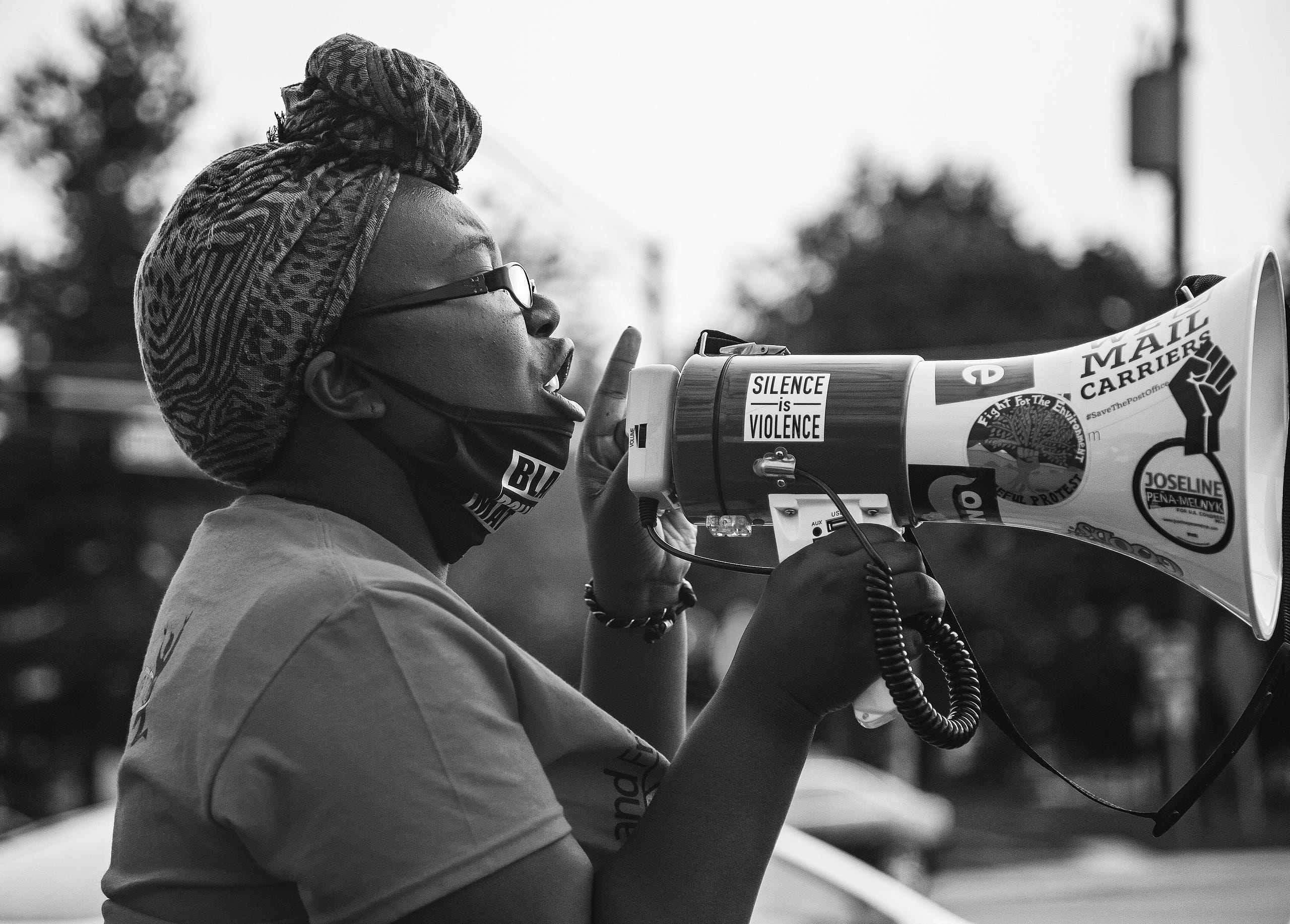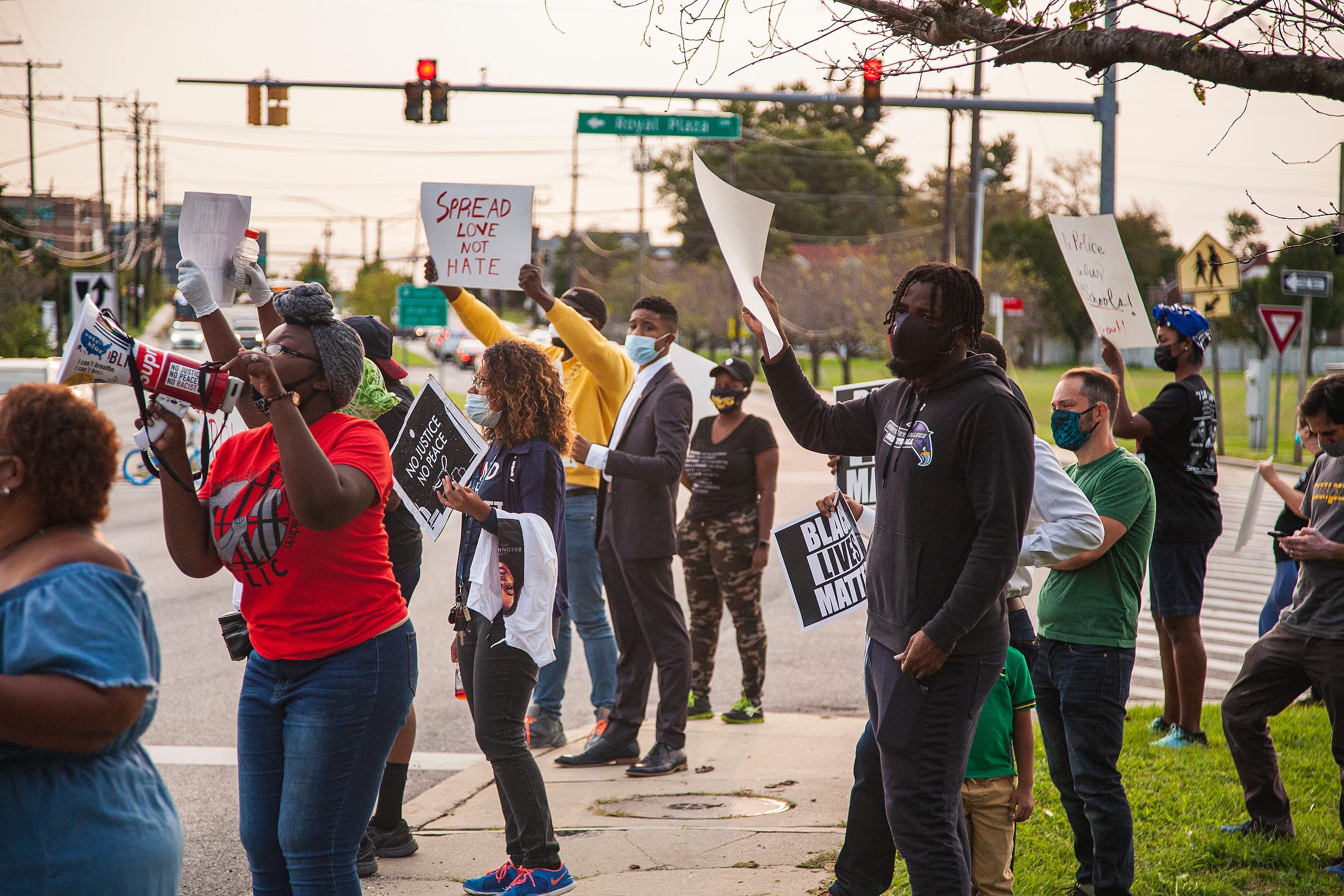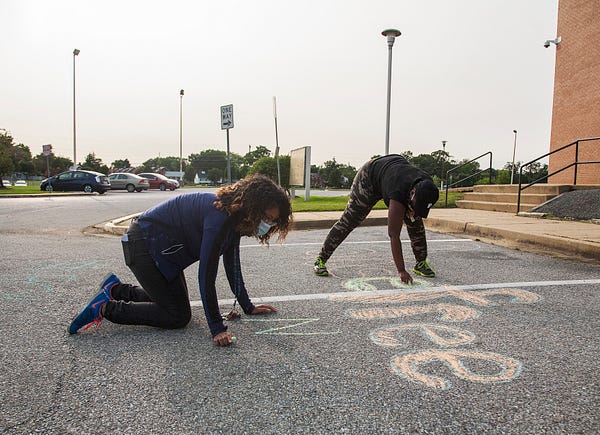Activists Protest To Keep School Resource Officers out of Prince George’s County Schools

Krystal Oriadha, a co-founder of P.G.County Change Makers, speaks through a bullhorn at the rally, on September 15, standing on the sidewalk in front of Suitland High School. Photo by Delonte Harrod, reporter, and CEO of The Intersection Magazine.
It was a little after 5 p.m. and the weather was cool, the sky was gray, and the protest — scheduled to start at 5 p.m. — had not begun. Other activists and concerned community members were still driving through Suitland High School’s gates around that time. In front of the auditorium, organizers had set up a table situated under a canopy. Hanging from that canopy was a Black Lives Matter sign. On the table lay, white poster boards, and markers for attendees who wanted to create signs publicly declaring their disagreements with the county's political decisions.
On September 15, activists and community members gathered at the school to protest the presence of School Resource Officers — P.G. County police officers — in some schools throughout the county. Activists want police officers out of schools because they arrest Black children for minor infractions, contributing to the school to prison pipeline. Attendees used colored chalk to inscribe slogans (“Counselors No Cops,” “Police Free Schools”) on the concrete, and later marched while chanting “No Justice No Peace.”
Krystal Oriadha, organizer and co-founder of PG Change Makers, said inscribing words onto the concrete was to let the Suitland residents know that they, the activists, stand in solidarity with those who want to remove SROs from the county’s schools.
Oriahda and Amity Pope, also co-founder of PG Change Makers, an organization started right after a police officer pressed his knee down on George Floyd’s neck that allegedly resulted in his death, organized the protest. The women have organized multiple protests in neighborhoods throughout the county: Fairmont and District Heights, Hyattsville, Bowie, and Fort Washington. Activists protested in Fort Washington, Maryland, a wealthy Black community with, at one point, the highest rates of COVID-19 cases in the county, were protesting an alleged case of police brutality. Cassy Morris, who was also present at this protest, told the Washington Blade that Lt. Victor Doboro, a P.G. County police officer, had aggressively approached her during another protest. She felt threatened. The case is pending against Doboro, according to the Washington Blade.

( Left To Right) Amity Pope (L), a co-founder of PG Change Makers, stands in Suitland High School at the protest. Protests inscribed slogans into the concrete. Photos by Delonte Harrod
Pope and Oriadha said they chose Suitland High School as a protest location SROs, and perhaps other security personnel had arrested 45 students, mainly, for fighting. According to Maryland’s 2018–19 school arrest data, Suitland High School had the second-highest arrests. Dr. Henry A. Wise, Jr. High School was first with 56. The same data shows that in that school year, the state recorded 3,141 total student arrests, and of those 1,766 were Black children. Most students were arrested for fighting. Black children, according to that year’s data, Black children are arrested more than any other ethnic group, even when they are the minority in majority-white counties. The state is not done compiling data on its county's final arrest numbers. However, the 2019 -20 data shows P.G. County arrested 280 students for mostly fighting, disruption, and weapons. Data shows that most of the arrests were conducted by school security, followed by SROs.
Prince George’s County Schools have about 33 SROs in various high schools, and 66 security personnel within these schools with the authority to arrest students. PGCPS has no say over which officer is commissioned to the schools. Prince George’s County Public School has a memorandum of agreement with Prince George’s County Police Department, the Hyattsville Police Department, Greenbelt Police Department, and Bowie Police Department. P.G. County pays $80,000 a year — not PGCPS — to departments for their service to the schools.
“We are making sure that P.G. County Board of Education knows that we don’t want cops in schools,” said Oriadha, who serves on a police reform task force created by Alsobrooks. “We came out to show this community our message, hoping they stand in solidarity with us, and to keep the pressure on for the vote that took place on Thursday.”
Pope said though children attend school online, due to COVID-19, it is important to remember that schools will reopen and if SROs are not removed — they will be present.
“If we really care about children — we will have an environment that fosters care,” said Pope, who has worked as an educator for about 20 years.
For the activists, removing SROs from schools is about providing children with access to better trauma-informed healthcare. Activists want county officials to sever its contract with P.G. County police officers and replace SROs with more mental health professionals to help children and teenagers with Adverse Childhood Experiences, which does result in post-traumatic stress syndrome. This could be done, Pope and Oriadha suggested, by PGCPS hiring more health officials. Pope said you can’t address these issues with the police officers locking up children.
“The way we react to trauma in schools has to be through care, and not SROs. SROs are not behavior specialists,” said Pope, who said she’s not anti-police but pro-life, pro-health, and pro-children. “They are…law enforcement. They’re armed with the power to arrest. They are not trained in brain psychology, nor cognitive development.”
Pope said such a reaction to a child with trauma only exacerbates the problem.
The police officers in schools, according to research, have not furthered an environment of learning.
In June, P.G. County Board of Education council members Raheela Ahmed and David Murray proposed legislation to terminate the county’s memorandum of agreement with various police departments within Prince George’s County. Ahmed and Murray also suggested using $5 million to hire more health professionals, replacing SROs. (In September, council members voted to postpone voting on removing SROs from schools until January).
Also in June, a report revealed that Prince George’s County police department is rife with racism, discrimination, retaliation, and instances of police brutality. Police Chief Hank Stawinski resigned after Tracee Wilkins, NBC Washington, Prince George’s County Bureau Chief, reported the claims of the document.

Protestors marched a short distance to Silver Hill Rd, a road in front of the high school, to protest SROs. Photos by Delonte Harrod
After attendees and organizers wrote slogans on the concrete with colored chalk, Oriadha grabbed the megaphone and informed the crowd about the next step. Oriadha told the crowd that they were going to march a short distance to Silver Hill Road, which is in front of the auditorium. The multiethnic crowd marched from the auditorium to the sidewalk with fists and signs raised in the air chanting: No Justice No Peace, What Does Democracy Look Like? This is what Democracy looks like!
It was there, on the sidewalk, that Oriadha and Pope allowed certain attendees to share personal stories and perspectives on police officers in schools. A student activist called out County Executive Angela Alsobrooks, school administrators, and other county elected officials. He said they have all failed the children and parents of PG County.
“When the teachers want to call the police rather than have a counselor come to the office or….have a counselor talk to a student — you know there is a problem,” the teenager passionately said. “When you have our young Black males on the street having nothing to do, and they call the police rather than ask ‘What is wrong with you?’,…you know there is a problem.”
“When I come to school, I feel intimidated,” said the young person. “Why do you (the police) have to sit outside my school? You don’t do that at White schools. You do it at my school. We need to change the way things are. We cannot feel intimidated by the police.”
The teenager went on to say that we need to let the police and everyone else know that Black Lives Matter. The teenager also offered solutions: “we need to strengthen Black communities like they were years ago” and suggested getting more youth to participate in civic life.
“When we look at young Black men and women, we are not looking at gangsters; were are not looking at thugs; we are not looking at criminals; we are not looking at people who might steal from you,” the young person continued. “ We are looking at future teachers, politicians, presidents, and leaders of the world.”
After he spoke, he gave the megaphone back to Oriadha, who cried because she was inspired by the young man’s words.
“What he said was so profound,” she said. “ When they see you, they don’t see what I see. But, I see you. We are going to make sure they see exactly who you are, exactly who you can become. We are going to rip down every single barrier that they put in front of our children, starting with the officers with the guns.”
Oriadha also lambasted some Black political leaders. She said, though the county has majority Black leadership, they still need to be challenged to enact policies for the common good.
“No longer do you get a pass because we [have the same skin pigmentation],” she said.

“There are expectations. We are going to hold you [accountable]. Unfortunately, we live in a county where all our leadership looks like us,” said Qiana Johnson, founder of Life After Release, a non-profit organization that supports formerly incarcerated women to re-enter their communities. “We live in the county where the County Executive children don’t go to school here. Are their police officers in those schools?”
Qiana Johnson, founder of Life After Release, speaks about her son being arrested by police officers. Photo by Delonte Harrod
Johnson has two sons. Before talking about the situation, she informed the small audience that her story about one of her son’s encounter with the police had nothing to do with SROs. She said that her son was riding an ATV in the woods around Clinton, Maryland, a somewhat rural area of P.G. County. She said police officers apprehended her 16-year-old son, whom she describes as being 6'4 and over 200 lbs. She said police officers never called to tell her that they had apprehended her son. According to Johnson, he was jailed for approximately 3 hours.
“The criminalization of our children’s behavior is something that we are not really realizing,” she said. “We don’t have the after school programs that we used to have. We have open stores, but not community centers that are open for our children during this time. No one is thinking about the children.”
Mentioning Marion Barry, a once-famous civil rights leader and Southeast Washington, D.C. Ward 8 council member, Johnson said politicians during that time had programs for the youth. Johnson said it’s abnormal to see SROs presence in schools. Johnson said she didn’t attend schools with police officers present. With SROs and school security guards present in the schools, Johnson said children view the schools as prisons.
“That looks like a prison to [the children], Johnson explained. I’ve been to prison — and that looks like a prison. The children are going to act like their being treated. If you treat them like animals, they’re going to act like animals. But if you treat [the children] like future doctors and lawyers, and treat them with respect, you’re going to get something…out of our youth.”
Johnson also challenged attendees to commit themselves to fight to get the SROs out of schools.
A woman, who appeared to be Black, interrupted Johnson as she continued to speak about her experience. She agreed with Johnson that police presence in schools was abnormal. And even shared her experience of being in schools without the presence of SROs. And she said Prince George’s County police department needs to be defunded.
“Take out it the budgeting committee to have things put back in our schools,” she said.
But the older woman pivoted and started to criticize Johnson and Black parents in general. The woman told Johnson that her son should have never been riding an off-road in the road.
“His ass shouldn’t have been on a four-wheeler anyway,” the woman passionately said. “He doesn’t need one. He doesn’t live in the country. There is no need [for that kind of vehicle in] the city.”
The woman said police officers are at schools to maintain a safe environment for learning. She said after the schools had experienced numerous fights, the P.G. County board of education members voted to put SROs in the schools.
The woman’s explanation of why she felt Johnson’s son didn’t need to ride an off-road bike in Clinton wasn’t accurate. Often children and young adults in DC and denser parts of Prince George’s County illegally ride off-road vehicles in the street, sometimes into ongoing traffic. It’s illegal to do so. Sometimes police officers chase them. However, they mostly leave them alone. But the woman misunderstood what Johnson had stated. Johnson stated that her son was riding his ATV in the woods — not in the city (Washington, D.C.). In rural Maryland, it is normal for children to ride their off-road bikes through wooded spaces.
Johnson interrupted her. “Have you ever been to Clinton ?” she asked. The woman did not reply. Johnson told the woman that she did not agree with her perspective and that it was OK for her son to ride his off-road vehicle in that area.
The woman’s statements seem to represent a perspective that says Black parents are to blame when police officers arrest and jail their children for minor infractions. Black people of this ilk wrongly suggest to other Black parents that to curb the school to prison pipeline and systemic racism they need to be better parents.
Oriadha interjected. She redirected the attendees to the meaning of the protest. She said the protest is for people who were against SROs in P.G. County schools, and that “this space” is not a platform for people to chastise other people about parenting. She strongly discouraged such behavior going forward.

Alexis Branch inscribes with chalk a slogan into the concrete at the protest. Photo By Delonte Harrod
Alexis Branch, who graduated from Gwynn Park High school, located in southern P.G. County, in 2015, first attended schools in Arlington, Virginia during her junior high years. However, her parents divorced while she was in junior high. The next year she attended Gwynn Park. There was a difference in the schools she noted. Schools in Arlington didn’t have police officers, and, she added, “there were no fights”. But Gwynn Park did have SROs, and that was her first experience of being in a school with police officers present.
“When I entered Gwynn Park High School, it confirmed to me that I was walking into an environment that was not safe; that there were going to fight; and that these police officers needed to be there for my protection,” explained Branch, who is a District 7 Board of Education candidate. “It was intimidating.”
Branch echoed, like so many others, what the young person said earlier (if you treat children like animals, they’re going to act like animals). Taking it a step further, she said if we treat children badly, they’re going to treat each other children the same, and then they will be disrespectful to adults.
“We are developing leaders for tomorrow,” she said. “ We cannot develop leaders with police officers in the schools because we are showing them that they’re not leaders, that they’re bad kids. I don’t think kids are bad.”
Branch also offered solutions: increase counselors based upon the number of children per school, children need to have regular contact with counselors, and we are not punishing children without first talking to them.
“Mental health is important,” she said.
Also, Michele Hall, a Prince George’s County assistant public defender, was present. She briefly spoke about her experience representing children in Maryland juvenile courts. She said police officers in schools contribute to the school to prison pipeline.
“ Every single day, I see the impact of seeing police officers in our schools,” said Hall, who has also written for The Atlantic Magazine. “The clients that I work with…are arrested for pushing a kid, and taking their lunch money. When I was in school that was considered bullying. It wasn’t an offense that would get you sent to juvenile court. When I went to a private school and you fought, you did not end up in jail.”
For those reasons I say: “COUNSELORS, NOT COPS.”

